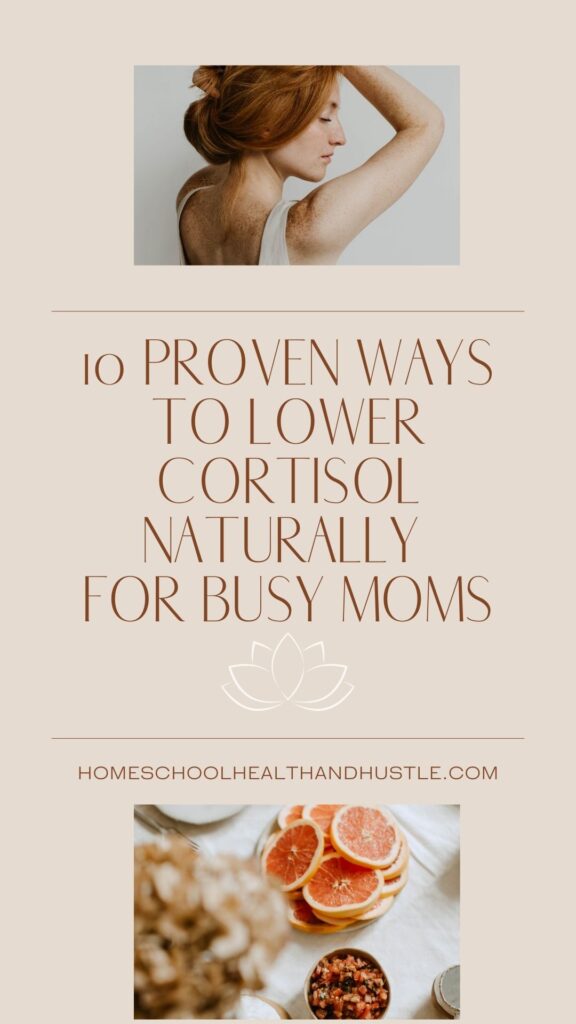Physical Address
304 North Cardinal St.
Dorchester Center, MA 02124
Physical Address
304 North Cardinal St.
Dorchester Center, MA 02124
Hey friends, I’m going to share a personal story with you. Lately, I’ve been feeling completely exhausted. Between the demands of work, homeschooling, and just the constant hustle of daily life, stress has been particularly high lately. I found myself lying awake at night, my mind racing, and I started noticing that despite my efforts, I was gaining a little weight—especially around my midsection. That’s when I decided to do some research and stumbled upon a surprising discovery: all these symptoms were pointing to one culprit—cortisol imbalance.
I realized that high cortisol wasn’t just about feeling stressed. It impacts so many areas of our health, from sleep to weight to overall mood. So I began exploring ways to naturally lower cortisol, and I’ve put together this guide of the top strategies that are realistic and effective, especially for busy moms like us. Here’s everything you need to know about how to lower cortisol naturally and start feeling more like yourself again.

As we all know, life as a busy mom comes with its share of stress, and that’s completely natural. But when stress sticks around, your body releases more of a hormone called cortisol. Known as the “stress hormone,” cortisol plays a role in many essential functions, from regulating blood pressure to managing how your body turns food into energy. But here’s the catch: when cortisol remains high for too long, it can lead to weight gain, constant fatigue, and make it harder to feel calm and centered. Understanding how to balance cortisol is so important to reclaiming your health and energy.
High cortisol levels don’t just drain your energy—they can also disrupt sleep, weaken your immune system, and contribute to stubborn weight gain, especially around your midsection. By learning how to lower cortisol naturally, you can restore your energy, improve your mood, and enhance your overall well-being. Let’s explore 10 powerful and practical ways to lower cortisol so you can take back control of your wellness!
Studies show that deep breathing activates your body’s relaxation response, which signals it to reduce cortisol levels. Breathing exercises like the 4-7-8 technique help calm your nervous system and bring oxygen to your brain, which naturally reduces anxiety.
Adaptogens, like ashwagandha, rhodiola, and holy basil, are herbs that help your body adapt to stress and regulate cortisol. Research has shown that ashwagandha, in particular, can reduce cortisol by as much as 30% in adults experiencing stress.
Lack of sleep is a big contributor to high cortisol levels. Research indicates that cortisol can spike after even one night of poor sleep, underscoring the importance of quality rest for managing stress.
Exercise reduces cortisol and increases endorphins, the “feel-good” hormones. However, moderate-intensity exercise, such as brisk walking, yoga, or light stretching, is most effective for managing cortisol without causing spikes that high-intensity workouts might trigger.
Blood sugar fluctuations influence cortisol levels, so eating balanced meals with protein, healthy fats, and fiber can prevent the spikes and crashes that can lead to cortisol surges. Proper nutrition supports hormone balance and helps prevent stress from depleting your energy.

Mindfulness and meditation are scientifically proven to reduce cortisol levels by promoting relaxation and calming the nervous system. Studies show that even brief mindfulness practices can significantly impact your body’s stress response, making it easier to manage daily stress.
While caffeine is a beloved pick-me-up, it can increase cortisol, especially if consumed in large amounts or in the afternoon. Studies suggest that caffeine intake is linked to higher cortisol levels, particularly when you’re already stressed. This one is really hard for me to completely give up, although I definitely have reduced caffeine and do not have any caffeine after noon.
Social support is a powerful reducer of cortisol and a natural stress reliever. Studies have shown that social connections help release oxytocin, a hormone that directly counteracts the effects of cortisol.
Essential oils, such as lavender and chamomile, have been shown to reduce cortisol levels. A few drops in a diffuser or on your pillow can create a soothing environment that encourages relaxation. Studies reveal that aromatherapy can improve mood and help regulate stress hormones.
Being “on” all the time can keep cortisol high. Research shows that short breaks, even microbreaks of just a few minutes, can reduce stress and improve focus. Taking these breaks helps prevent burnout and gives your mind and body a chance to reset.
The good news is that finding natural ways to lower cortisol doesn’t require a life overhaul. By taking these small, actionable steps, you can start reducing stress, regaining energy, and reclaiming the calm that your busy life deserves. Remember, each change you make adds up, so give yourself grace and make progress at your own pace.

What are the symptoms of high cortisol levels?
High cortisol can lead to symptoms like weight gain (especially around the abdomen), fatigue, irritability, and trouble sleeping. Many moms notice they feel “tired but wired” or experience frequent mood swings.
How quickly can I lower my cortisol naturally?
Reducing cortisol naturally takes time, and it varies by person. Some moms notice improvements within days, especially with methods like deep breathing and mindfulness. Adaptogens and consistent sleep improvements may show results within a few weeks.
Can diet alone lower cortisol levels?
Yes, a balanced diet rich in whole foods, lean proteins, and healthy fats can stabilize blood sugar, which helps regulate cortisol. Combining dietary changes with other strategies, like exercise and relaxation techniques, is most effective.
How much cortisol is considered normal?
Normal cortisol levels fluctuate throughout the day, peaking in the morning and decreasing in the evening. Chronic high cortisol can impact health, so if you’re concerned, consider consulting a healthcare professional for testing.
I would love to hear your tips and stories. What’s your favorite way to unwind? Share in the comments below! Don’t forget to join the email list so that you don’t miss out on any of the new and exciting things that are in the works!
Sources:
The Effect of Diaphragmatic Breathing on Attention, Negative Affect and Stress in Healthy Adults
Ashwagandha and Cortisol: The Connection Explained
Sleep Loss Results in an Elevation of Cortisol Levels the Next Evening